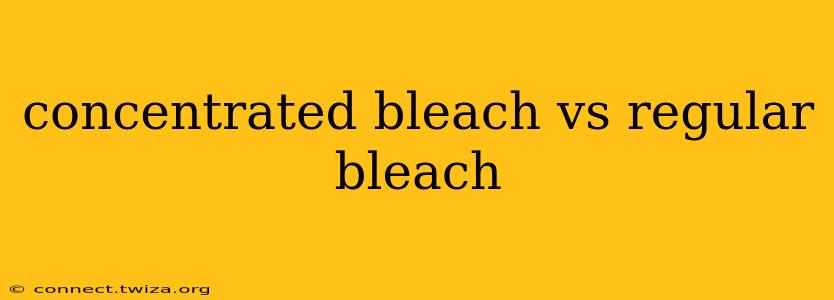Household bleach is a powerful cleaning agent, but not all bleaches are created equal. Understanding the differences between concentrated bleach and regular bleach is crucial for safe and effective cleaning. This guide will clarify the distinctions, address common questions, and provide essential safety tips.
What is Concentrated Bleach?
Concentrated bleach, also known as industrial bleach or commercial bleach, contains a higher concentration of sodium hypochlorite (the active bleaching agent) than regular household bleach. This typically ranges from 10% to 15% sodium hypochlorite, compared to the 3-6% found in regular household bleach. This higher concentration makes it significantly more potent and effective for certain industrial or large-scale cleaning tasks. However, this also means it presents a greater risk if handled improperly.
What is Regular Bleach?
Regular household bleach, readily available in grocery stores, usually contains 3-6% sodium hypochlorite. This is diluted for safety and domestic use. It’s suitable for most household cleaning tasks like laundry, disinfecting surfaces, and whitening clothes. While effective, it's less potent than concentrated bleach.
What's the Difference in Cleaning Power?
Concentrated bleach's higher sodium hypochlorite concentration translates to stronger bleaching and disinfecting power. It's far more effective at removing stubborn stains and disinfecting heavily soiled areas. Regular bleach is sufficient for most household cleaning needs but might struggle with heavily soiled or ingrained stains.
Can I Use Concentrated Bleach for Household Cleaning?
While concentrated bleach can clean more effectively, it's generally not recommended for household use. Its high concentration increases the risk of accidental burns, damage to fabrics or surfaces, and inhalation of harmful fumes. Using diluted concentrated bleach can be extremely dangerous if done incorrectly. Regular household bleach is far safer and more appropriate for home cleaning.
How Do I Dilute Concentrated Bleach Safely?
Never attempt to dilute concentrated bleach without appropriate safety equipment and thorough knowledge of the proper dilution ratios. Consult the product's safety data sheet (SDS) for precise dilution instructions and safety precautions. Always add the bleach to the water, never the other way around, to prevent splashing and dangerous reactions.
Is Concentrated Bleach More Dangerous?
Yes, concentrated bleach is significantly more dangerous than regular bleach due to its higher concentration of sodium hypochlorite. Improper handling can lead to serious health consequences, including:
- Skin burns and irritation: Direct contact can cause severe chemical burns.
- Eye damage: Bleach splashes in the eyes can lead to blindness.
- Respiratory problems: Inhalation of fumes can cause coughing, wheezing, and other respiratory issues.
What are the Best Uses for Concentrated Bleach?
Concentrated bleach is primarily used in industrial settings, such as:
- Water treatment: Disinfecting water supplies.
- Pulp and paper bleaching: Whitening paper pulp.
- Textile bleaching: Bleaching fabrics in industrial settings.
What Safety Precautions Should I Take When Using Bleach (Concentrated or Regular)?
- Ventilation: Always work in a well-ventilated area.
- Gloves and eye protection: Wear appropriate protective gear to avoid contact with skin or eyes.
- Never mix bleach with other cleaning products: Mixing bleach with ammonia or acids can create toxic gases.
- Store bleach properly: Keep bleach out of reach of children and pets, in a cool, dark place.
- Follow product instructions: Always read and follow the manufacturer's instructions carefully.
In summary, while concentrated bleach offers superior cleaning power, its increased danger makes it unsuitable for most household purposes. Regular household bleach is the safer and more practical option for most domestic cleaning tasks. Always prioritize safety when using any type of bleach.
